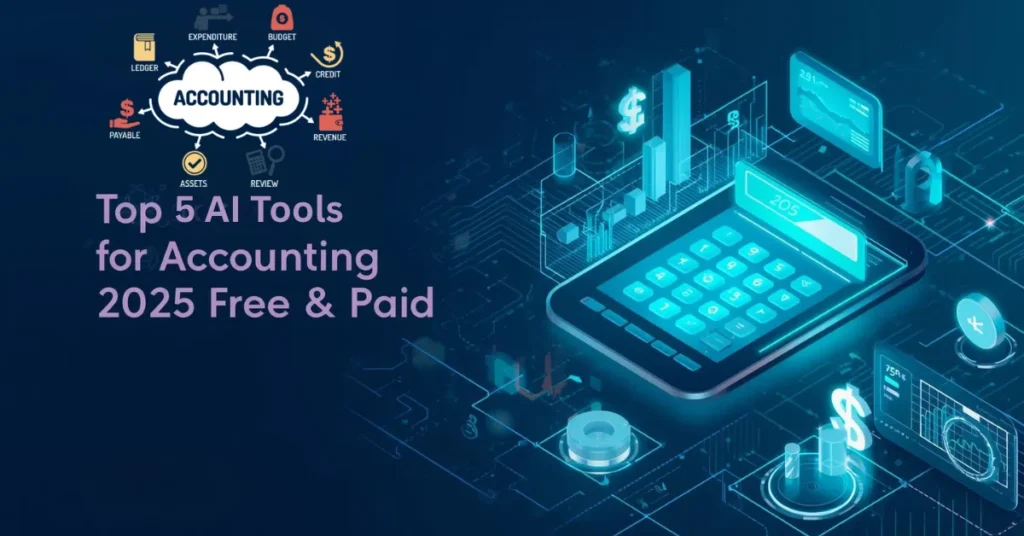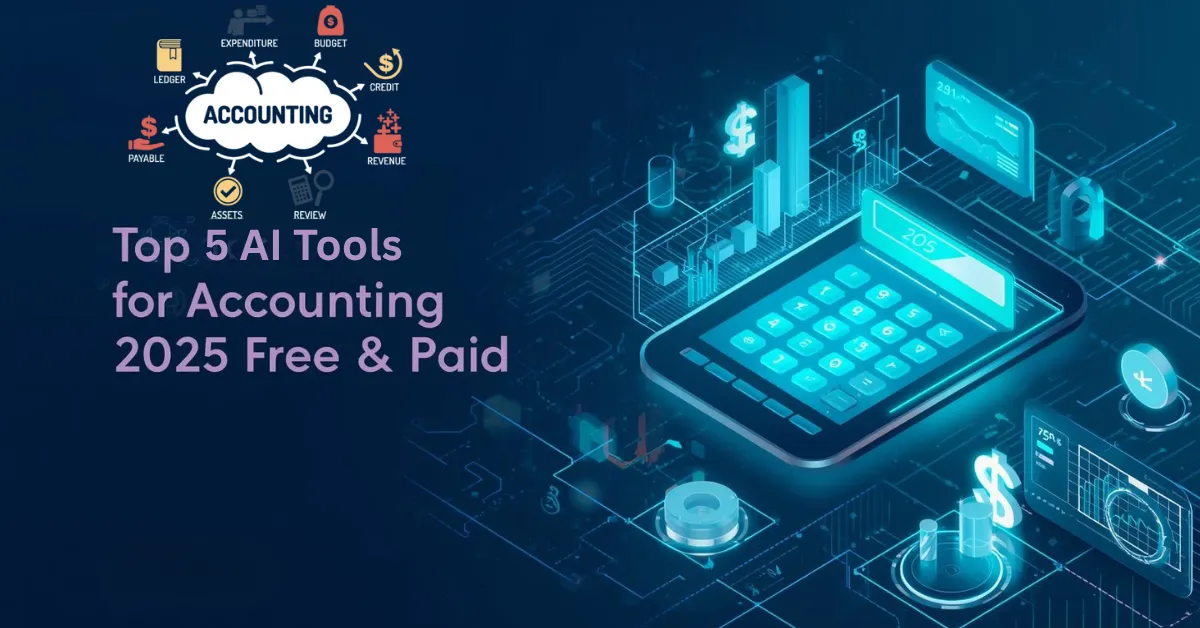AI Tools For Accounting has evolved far beyond simply entering numbers in spreadsheets. Today’s accountants and financial professionals are closing books faster, reconciling more transactions daily, providing real-time insights, and managing compliance and audits under increasing pressure. Manual processes, invoice data entry, vendor matching, bank reconciliation, and month-end close, still Disadvantagesume huge amounts of time and risk of error.
AI tools for accounting step in as powerful assistants: automating repetitive tasks, flagging anomalies, providing predictive cash-flow insights, summarising large transaction volumes, and helping teams focus on strategy rather than back-office drudgery. For any firm or business seeking to boost accuracy, save hours each week, and shift from ledger-keepers to advisors, AI tools are now indispensable.
In this guide, we’ll explore the top 5 AI tools for accounting in 2025. For each, you’ll know the features, pricing plans, Advantages & Disadvantages, and who it’s It is perfect for. By the end, you’ll have a clear idea of which AI solution fits your accounting needs and budget.
Top 5 AI Tools For Accounting in 2025: Features & Prices
1. Vic.ai: Invoice & Accounts Payable Automation
Vic.ai is designed for accounting firms and enterprises focusing on accounts payable (AP) automation, purchase-order matching, approvals routing, and month-end audit support.
According to recent reviews, Vic.ai “uses AI and machine learning to automate accounts payable… starting at a Disadvantagesiderable $1,490/month for firms” in one pricing source.
Major Features
- Invoice capture & extraction using OCR/AI from multiple document types.
- AI purchase-order matching: auto-match PO to invoice/receipt, route approvals.
- Automated monthly audits and reconciliation.
- Real-time dashboards showing AP pipeline, pending approvals, risky invoices.
Pricing Plans
| Plan | Price | Notes |
| Enterprise | Starting $1,490/month | For accounting firms, custom pricing |
Advantages
- Powerful AP automation reduces manual invoice entry and approvals.
- Good for firms with high volume of vendor invoices and PO matching.
- Helps cut closing time and reduce errors in a congested process.
Disadvantages
- Entry cost is high, may not suit small businesses or startups.
- Focused on AP rather than full-ledger automation.
- Customisation and integration are needed for complex workflows.
It is perfect for mid-sized to large accounting firms or corporate finance teams with heavy vendor/invoice volume who need to expedite AP workflows.

2. Trullion: Lease Accounting, Revenue Recognition & Audit AI
Trullion is an AI-powered accounting platform built for automation of critical finance tasks: lease accounting (ASC 842/IFRS 16), revenue recognition (ASC 606/IFRS 15), audit readiness, and data extraction from contracts.
Major Features
- Contract extraction: AI reads leases, agreements, and extracts terms.
- Automated journal entries for leases and revenue recognition.
- Audit workflows, data matching, validation, and control dashboards.
- Unified platform across multiple entities and standardisations.
Pricing Plans
(Official pricing is custom & enterprise-level; publicly listed only as “enterprise grade”.)
Advantages
- Excellent for compliance-heavy tasks like leases and revenue recognition.
- Saves the high cost of manual contract review and audit preparation.
- Enables finance teams to move faster and reduce risk.
Disadvantages
- Most suitable for large enterprises; cost may be high for smaller companies.
- Requires integration and training to adopt fully.
- Narrower scope (leases, revenue, audit) rather than full general ledger automation.
It is perfect for Finance teams in larger organisations, multinational companies, or those facing complex compliance and audit requirements.
3. Zeni AI: Bookkeeping & Real-Time Financial Intelligence
Zeni offers AI bookkeeping, expense management, billing, and real-time financial insights for businesses and startups. It markets as “Your CFO just got an AI upgrade.”
Major Features
- Auto-categorisation of bank transactions, bills, and expenses.
- Invoice processing, bill-pay automation, reimbursements.
- Dashboards and real-time financial reports for operations.
- Integrations with common accounting tools and business banking.
Pricing Plans: Exact pricing not publicly pinned for all plans; free demo available.
Advantages
- Startup and small business-friendly with real-time insights.
- Automates bookkeeping so teams can focus on analysis rather than data entry.
- Good partner for growing businesses wanting to scale financial processes.
Disadvantages
- May not have advanced enterprise features like multi-entity consolidation or audit modules.
- Custom pricing may still be required depending on volume.
- Businesses must still review AI decisions for accuracy.
It is perfect for small to medium-sized companies, startups, or finance functions wanting to outsource or automate bookkeeping and get live financial visibility.
4. Digits: AI-Native Accounting Platform
Digits is positioned as “automated accounting for the AI era,” offering bank-card integration, automated categorization, invoice processing, vendor & customer tracking, and real-time financial dashboards.
Major Features
- 24/7 accurate categorisation of transactions.
- Vendor/invoice processing, bill pay with approvals.
- Real-time interactive financial reporting and insights.
- Integration with banking, cards, ledger tools, and custom reports.
Pricing Plans: Some features publicly listed; full pricing may depend on scale.)
Advantages
- Built from the ground for AI accounting,not just added AI features.
- Strong for businesses with frequent transactions, many vendors/customers.
- Real‐time dashboards help decision-making rather than just historical processing.
Disadvantages
- For small businesses with very simple finance needs, it may be more than necessary.
- Custom pricing and onboarding may be required.
- Some advanced features may still require manual review.
It is perfect for fast-growing businesses, fintech™, service firms, or organisations with high transaction volume needing live insights and automated ledger workflows.
5. AI Accountant (generic name) – Auto Bookkeeping & Ledger Entry
AI Accountant is a tool that claims to read every transaction, map to the correct ledger, match invoices and bills automatically, and produce clean books, from platforms like Tally, Zoho, etc.
Major Features
- Transaction ingestion from bank/card statements.
- Automatic ledger mapping and bookkeeping entries.
- One-click sync to the accounting tool.
- Real-time analytics and dashboards for financial control.
Pricing Plans: Exact public pricing not fully documented; tool positioning indicates time savings and cost reduction.
Advantages
- Big time-saver on manual data entry, reduces up to 75% of time.
- Works with existing accounting systems, which makes adoption easier.
- Good for firms wanting to digitalise their bookkeeping quickly.
Disadvantages
- May lack advanced audit or multi-entity features compared to enterprise tools.
- Correctness depends on the initial training of mappings and review.
- Smaller firms still need human oversight for strategy and exceptions.
It is perfect for accountants, small to mid-sized finance teams, and SMEs wanting to reduce bookkeeping workload, tidy their ledgers, and get faster close.
Check More AI Tools for Professionals Here!
Pricing Comparison Table, Top 5 AI Tools for Accounting
| Tool Name | Free / Entry Plan | Paid Plans & Pricing |
| Vic.ai | No prominent free tier | Starting $1,490/month for accounting firms |
| Trullion | No public basic bracket | Custom enterprise pricing |
| Zeni | Free demo or trial available | Custom pricing |
| Digits | Basic access may exist | Custom pricing |
| AI Accountant | Free basic claim | Custom pricing |
How to Choose the Right AI Tools for Accounting Workflow?
- Vic.ai for invoices
- Trullion for compliance
- Zeni / Digits for visibility
- AI Accountant for automation
- Choose Trullion / Vic.ai for robust needs
- Choose Zeni / Digits / AI Accountant for easy deployment
- Contact vendors for custom pricing
The accounting profession is being reshaped by AI. The tools above show how automation, real-time analytics, and intelligent workflows are now within reach. For businesses that act, these AI accounting tools offer faster closes, improved accuracy, better insights, and freed capacity for advisory work.

1 thought on “Top 5 AI Tools for Accounting 2025 (Free & Paid): Major Features and Pricing Plans”